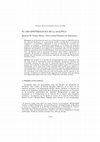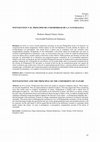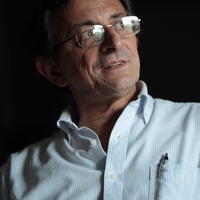Videos by Modesto Gómez Alonso
Seminario “Filosofía, Lenguaje y Emociones”, Proyecto “Tecnociencia, Filosofía y Medio Ambiente” ... more Seminario “Filosofía, Lenguaje y Emociones”, Proyecto “Tecnociencia, Filosofía y Medio Ambiente” de la SCAIT / Facultad de Filosofía y Letras, Instituto de Estudios Antropológicos y Filosofía de la Religión, Universidad Nacional de Tucumán, Argentina, 22/06/2021.
Conferencia invitada 22 views
Books by Modesto Gómez Alonso
Juicio y agencia, 2023
La obra de Ernest Sosa, que combina el debate más actual con el diálogo perenne, que apela a Reid... more La obra de Ernest Sosa, que combina el debate más actual con el diálogo perenne, que apela a Reid y a Moore, y con un énfasis cada vez mayor a Aristóteles, a Descartes, al pirronismo y a Wittgenstein, para arrojar luz sobre controversias epistemológicas contemporáneas, posee una profundidad de análisis y una estructura sistemática poco frecuentes. Se trata de una concepción perspicua, enraizada en la historia de la disciplina, unitaria y coherente.
Prensas Universitarias de Zaragoza. ISBN 978-84-1340-299-4, 2021
La teoría de virtudes de Ernest Sosa ha modificado decisivamente la historia de la epistemología,... more La teoría de virtudes de Ernest Sosa ha modificado decisivamente la historia de la epistemología, instituyendo un nuevo marco epistemológico que, además de derogar las consecuencias paralizadoras del programa de Gettier, instaura una problemática propia. Se trata de una nueva síntesis que trasciende pero que también integra dualidades anteriores. Las contribuciones a este volumen analizan en qué ha consistido la revolución de Sosa en epistemología, centrándose para ello en su producción más reciente.
En "Con pleno conocimiento", Ernest Sosa desarrolla su versión más madura de epistemología de vir... more En "Con pleno conocimiento", Ernest Sosa desarrolla su versión más madura de epistemología de virtudes, una versión que, distanciándose de las teorías de la mera aptitud, propone una concepción de la normatividad epistémica y de la naturaleza del conocimiento humano en la que se priorizan las nociones de meta-aptitud y de conocimiento reflexivo. El autor aplica su planteamiento a la discusión de algunos de los temas más polémicos del panorama epistemológico reciente: la agencia epistémica, la norma de la creencia, el estatus ontológico de la experiencia, la epistemología del testimonio, o la elucidación de por qué el conocimiento siempre tiene más valor que la mera creencia verdadera. El volumen se cierra con un argumento trascendental que justifica la confianza en nuestras facultades epistémicas. Se trata de una obra imprescindible de la epistemología contemporánea.
Papers by Modesto Gómez Alonso

Thémata. Revista de filosofía, 2012
Las pretensiones del autor son: (i) Describir los rasgos metafilosóficos de las dos corrientes do... more Las pretensiones del autor son: (i) Describir los rasgos metafilosóficos de las dos corrientes dominantes en el pensamiento analítico contemporáneo: el relativismo terapéutico y el naturalismo; subrayando la crisis de identidad de la filosofía que configura su trasfondo y deteniéndose especialmente en el análisis del programa quineano de naturalización de la epistemología. (ii) Realizar una evaluación de dichas tendencias que desemboca en la defensa de un humanismo crítico, de una concepción autónoma y sustantiva de la actividad filosófica y de la necesaria conciliación de lógica y ética. (iii) Mostrar cómo la superación del divorcio entre verdad y significado y la recusación del principio de aislamiento constituyen el hilo conductor de tres de los filósofos más sobresalientes en el panorama anglosajón del último siglo: Wittgenstein, Davidson y Sosa.
Cuadernos salmantinos de filosofía, 2024
The main purpose of this article is to anchor the basic principles of judgmental performances int... more The main purpose of this article is to anchor the basic principles of judgmental performances into reality, and thus, to capture the vertical axis of cognition. To this end, it is argued that the normative force of explicit, discursive self-knowledge is neither merely grounded in dialectical inescapability nor in default assumptions. The goal is to argue that the ultimate überhinge is so perfectly known that the questions of justification, truth-value and empirical cognoscibility lose any sense in regards to it. Hinge normativity, which can be reduced neither to epistemic (telic) normativity nor to practical normativity, emerges from this view. The shortcomings of neo-Kantian views of the sources of normativity in gnoseology are exposed and analysed.

Cognitive Vulnerability. An Epistemological Approach. De Gruyter. Berlin Studies in Knowledge Research, volume 18, 2023
The project of a conjunctive analysis of basic phenomena such as paradigm cases of disposition as... more The project of a conjunctive analysis of basic phenomena such as paradigm cases of disposition ascriptions, attribution of voluntariness to action, and empirical, exempted-from-doubt knowledge is related to the epistemological program of giving an account of how those fundamental beliefs must be evidentially formed so as to be properly formed. By opposing this model, Wittgensteinian antireductivism leads to acknowledge that there does exist another kind of primitive "knowledge," which is naturally acquired without ratiocination. This paper aims at providing three examples of current philosophical debates where a Wittgensteinian deconstruction is illuminating-the "powers and conditionals" debate, the problem regarding the causal distinction between happenings and intentional actions, and the question of how we acquire justified beliefs about external reality. The trouble in all these cases is that the default position can undercut common sense as the ultimate locus of intelligibility. In addition, Wittgenstein 's epistemic pluralism is defended.
Introducción y Nota del Traductor a Juicio y Agencia, 2023
Cualquier forma de reproducción, distribución, comunicación pública o transformación de esta obra... more Cualquier forma de reproducción, distribución, comunicación pública o transformación de esta obra solo puede ser realizada con la autorización de sus titulares, salvo excepción prevista por la ley. Diríjase a CEDRO (Centro Español de Derechos Reprográficos, www.cedro.org) si necesita fotocopiar o escanear algún fragmento de esta obra.
Epistemologia dos eixos. Interpretações e debates sobre as (in)certezas de Wittgenstein. Nara Miranda de Figueiredo, Plínio Junqueira Smith (organizadores). Editora Fundação Fènix , 2022
Há uma estrutura da justificação perceptiva?

Topoi 41 (5), 2022
It is generally assumed that hinge-commitments are deprived of an epistemically normative structu... more It is generally assumed that hinge-commitments are deprived of an epistemically normative structure, and yet, that although groundless, the acceptance of Wittgensteinian certainties is still rational. The problem comes from the intellectualist view of hinge-approvals which many recent proposals advance-one that falls short of the necessities and impossibilities pertaining to what would be the right description of how it is like to approve of hinges. I will raise the Newman-inspired worry as how to cash the abstract acceptance of principles of enquiry into real assent, as well as the question about how to extend normativity all the way back to foundations. It is my aim here to argue that ethical normativity is the only kind of normativity capable to ground the rationality of hinges. In defence of this, I will draw some consequences from Ernest Sosa's claim that hinges about the external world are logically related to the cogito.
Cuadernos salmantinos de filosofía, 2022
Sképsis: Revista de Filosofia, 2022
Gómez-Alonso, M., Pérez Chico, D., (eds.), 2021, Ernest Sosa: Conocimiento y virtud (Zaragoza: PUZ) 129-158 [ISBN 978-84-1340-299-4], 2021

ἔλεγχος. Revista de la Sociedad Filosófica del Uruguay, 2021
Resumen. En Sobre la certeza existen numerosas ocasiones en las que Wittgenstein invita a los lec... more Resumen. En Sobre la certeza existen numerosas ocasiones en las que Wittgenstein invita a los lectores a la categorización de objetos imaginarios. Dichos objetos no sólo son hipotéticos. Se trata, además, de objetos y de acontecimientos sin precedentes. Esto puede llevar a pensar que al considerar casos que contarían como irregularidades naturales, Wittgenstein se está enfrentando a una forma radical de escepticismo que pone en cuestión la uniformidad de la naturaleza, y que, en consecuencia, hace que el valor de verdad de proposiciones acerca de objetos físicos actuales quede a merced de eventos futuros. Podría pensarse que bastaría con hacer del principio de uniformidad de la naturaleza una proposición-gozne constitutiva de la racionalidad epistémica inductiva (tal como se presupone que hizo el propio Wittgenstein) para que la amenaza del escepticismo humeano quedase cortada de raíz. El propósito de este artículo es el de arrojar dudas sobre la concepción constitutivista de las certezas de Wittgenstein. Por una parte, se recusará la tesis de que los compromisos-gozne son capaces de salvar la distancia que media entre el área de lo epistemológicamente básico y nuestras prácticas ordinarias. En segundo lugar, se defenderá una concepción regulativa del principio de uniformidad. Dicha concepción presupone un modelo no-epistémico y no-cognitivo de la noción de racionalidad.

Análisis. Revista de Investigación Filosófica, 2021
In the Notebooks 1914-1916, Wittgenstein engages himself in a dialogue with Schopenhauer’s projec... more In the Notebooks 1914-1916, Wittgenstein engages himself in a dialogue with Schopenhauer’s project —one that Wittgenstein makes his own— of substituting an immanent metaphysics of human experience for the transcendent metaphysics discredited by Kant’s critique, and thus for finding a path that would be able both of capturing the reality of human agency and of staying away from the kind of self-alienation that appears to be the necessary consequence of philosophical reflection. Wittgenstein’s
reflections on the ethical and the metaphysical will are instrumental to bring this project to successful completion. However, I will go well beyond Wittgenstein’s early work in order to elucidate what strikes me as the solution provided by the late Wittgenstein (mainly, in On Certainty) to two problems that the Notebooks and the Tractatus left unanswered. On the one hand, there is the question about whether the agreement between agency and passivity is possible—namely, about how to come to
see the friction of the world not only as something that is, but rather as something that ought to be. On the other, there is the problem of how to make of ethical subjectivity and metaphysical subjectivity two constitutively co-related aspects of the same transcendental subjectivity.
Keywords: Agency, Free Will, Meaningfulness, Schopenhauer, Transcendental Subjectivity.

Logos. Anales del Seminario de Metafísica, 2021
In Judgment and Agency, Ernest Sosa argues for a triple-S structure of complete competences that ... more In Judgment and Agency, Ernest Sosa argues for a triple-S structure of complete competences that includes, besides the innermost seat competence of the agent, her overall intrinsic condition (shape) and the right situational factors for the manifestation of cognitive success to occur. Complete competences are context-sensitive. The question is raised whether epistemic competences are extrinsic or intrinsic dispositional properties, as well as whether knowledge is the manifestation of powers of
the actual world or whether it is a matter of what happens in modally close worlds. An ontological background for the context-sensitivity of epistemic competences that is compatible with their intrinsic character is set in the context of a general account of dispositions. An actualist conception of knowledge is also provided. On this view, the modal force of knowledge, far from being captured by non-localized possibilities, is rooted in the directedness of powers. This article, thus, aims at making explicit the
ontological underpinnings of knowledge in a way that it is consistent with Sosa’s fully dispositional virtue epistemology. To this end, the constitution of complete competences is placed in a proper perspective.

Disputatio. Philosophical Research Bulletin, 2019
ABSTRACT
In Extended Rationality (2015), Annalisa Coliva provides an important contribution to a ... more ABSTRACT
In Extended Rationality (2015), Annalisa Coliva provides an important contribution to a family of possible views about epistemic justification which are mainly inspired by Wittgenstein’s notion of hinges. According to Coliva, the extended rationality view fares much better than alternative candidates of the same genus in dealing with the sceptical challenge as it is expressed by the Agrippan trope of arbitrary assumption. On the sceptical view, the fact that Wittgensteinian hinges are neither justified nor warranted would seemingly entail that they are not epistemically rational. It is the aim of this article to assess Coliva’s way of facing up to this challenge, as well as to show that Coliva’s arguments fall short of their target, or so it appears. One might say that, in spite of Coliva’s explicit claims to the contrary, her approach falls prey of a cognitive account of the notion of reason, and that her view is driven by the same illusion driving the sceptic: the uncritical adoption of a passive view of how the human mind is primarily related to the world.

Revista Filosofía UIS, 2021
Resumen: es comúnmente reconocida la relación íntima que la casa que Wittgenstein construyó para ... more Resumen: es comúnmente reconocida la relación íntima que la casa que Wittgenstein construyó para su hermana guarda con el proyecto del Tractatus-un proyecto que haciendo visible el mundo tal como la ciencia lo representa, despierta en el lector la necesidad apremiante de una reorientación ética de su vida. Sin embargo, Wittgenstein llegó a percibir ambas obras como fracasos. Los objetivos de este artículo son I) dilucidar la razón (o razones) de dicho fracaso; II) argumentar que el segundo Wittgenstein no abandonó su proyecto ético, sino que modificó las estrategias para llevarlo a cabo-algo que también afectó a su concepción de la filosofía; y III) mostrar cómo Wittgenstein pudo resolver un problema básico para el conservadurismo tardío anclándolo en el orden inherente a la actividad humana ordinaria.
Palabras clave: Contrailustración, Crítica cultural, Estética, Ética, Schopenhauer, Wittgenstein.
Abstract: it is common wisdom that the house built by Wittgenstein for his sister is intimately related to the Tractarian project —one that by means of displaying the structure of the world as science finds it, was directed to create a sense of spiritual desolation, so as to awake a pressing need for ethical transformation. Eventually, Wittgenstein came to see the Tractatus and the house as failures. The aims of this article are: I) to elucidate the nature of this perceived failure; II) to argue that Wittgenstein never abandoned this ethical project, although he radically changed the means for realizing it, and consequently, his conception of philosophy; and III) to show how Wittgenstein came to solve a basic problem for late conservatism by grounding it in the inherently patterned nature of the ordinary.
Keywords: Aesthetics, Counter-Enlightenment, Cultural Criticism, Ethics, Schopenhauer, Wittgenstein.

TRANS/FORM/AÇÃO: REVISTA DE FILOSOFIA e-ISSN 1980-539X | ISSN 0101-3173, 2021
For many hinge epistemologists, general, background assumptions are principles that help providin... more For many hinge epistemologists, general, background assumptions are principles that help providing default or presumptive justification to our empirical beliefs. However, the ‘blanketing’ nature of a priori arguments to the end of supporting the rationality of general assumptions might be seen as the Trojan horse through which radical scepticism threatens the common sense picture of the world. Sosa’s recent distinction between background presuppositions and domain-defining conditions, as well as his claim that agents are not negligent for dismissing global scenarios as irrelevant to epistemic normativity, are instrumental to avoid an epistemic construal of über hinges, and thus, to a reassessment of the function they really perform in regards to ordinary practices of judgment.
Keywords: Agency. Epistemic Negligence. Hinge Epistemology. Humean Scepticism. Virtue Epistemology.











Uploads
Videos by Modesto Gómez Alonso
Conferencia invitada
Books by Modesto Gómez Alonso
Papers by Modesto Gómez Alonso
reflections on the ethical and the metaphysical will are instrumental to bring this project to successful completion. However, I will go well beyond Wittgenstein’s early work in order to elucidate what strikes me as the solution provided by the late Wittgenstein (mainly, in On Certainty) to two problems that the Notebooks and the Tractatus left unanswered. On the one hand, there is the question about whether the agreement between agency and passivity is possible—namely, about how to come to
see the friction of the world not only as something that is, but rather as something that ought to be. On the other, there is the problem of how to make of ethical subjectivity and metaphysical subjectivity two constitutively co-related aspects of the same transcendental subjectivity.
Keywords: Agency, Free Will, Meaningfulness, Schopenhauer, Transcendental Subjectivity.
the actual world or whether it is a matter of what happens in modally close worlds. An ontological background for the context-sensitivity of epistemic competences that is compatible with their intrinsic character is set in the context of a general account of dispositions. An actualist conception of knowledge is also provided. On this view, the modal force of knowledge, far from being captured by non-localized possibilities, is rooted in the directedness of powers. This article, thus, aims at making explicit the
ontological underpinnings of knowledge in a way that it is consistent with Sosa’s fully dispositional virtue epistemology. To this end, the constitution of complete competences is placed in a proper perspective.
In Extended Rationality (2015), Annalisa Coliva provides an important contribution to a family of possible views about epistemic justification which are mainly inspired by Wittgenstein’s notion of hinges. According to Coliva, the extended rationality view fares much better than alternative candidates of the same genus in dealing with the sceptical challenge as it is expressed by the Agrippan trope of arbitrary assumption. On the sceptical view, the fact that Wittgensteinian hinges are neither justified nor warranted would seemingly entail that they are not epistemically rational. It is the aim of this article to assess Coliva’s way of facing up to this challenge, as well as to show that Coliva’s arguments fall short of their target, or so it appears. One might say that, in spite of Coliva’s explicit claims to the contrary, her approach falls prey of a cognitive account of the notion of reason, and that her view is driven by the same illusion driving the sceptic: the uncritical adoption of a passive view of how the human mind is primarily related to the world.
Palabras clave: Contrailustración, Crítica cultural, Estética, Ética, Schopenhauer, Wittgenstein.
Abstract: it is common wisdom that the house built by Wittgenstein for his sister is intimately related to the Tractarian project —one that by means of displaying the structure of the world as science finds it, was directed to create a sense of spiritual desolation, so as to awake a pressing need for ethical transformation. Eventually, Wittgenstein came to see the Tractatus and the house as failures. The aims of this article are: I) to elucidate the nature of this perceived failure; II) to argue that Wittgenstein never abandoned this ethical project, although he radically changed the means for realizing it, and consequently, his conception of philosophy; and III) to show how Wittgenstein came to solve a basic problem for late conservatism by grounding it in the inherently patterned nature of the ordinary.
Keywords: Aesthetics, Counter-Enlightenment, Cultural Criticism, Ethics, Schopenhauer, Wittgenstein.
Keywords: Agency. Epistemic Negligence. Hinge Epistemology. Humean Scepticism. Virtue Epistemology.
Conferencia invitada
reflections on the ethical and the metaphysical will are instrumental to bring this project to successful completion. However, I will go well beyond Wittgenstein’s early work in order to elucidate what strikes me as the solution provided by the late Wittgenstein (mainly, in On Certainty) to two problems that the Notebooks and the Tractatus left unanswered. On the one hand, there is the question about whether the agreement between agency and passivity is possible—namely, about how to come to
see the friction of the world not only as something that is, but rather as something that ought to be. On the other, there is the problem of how to make of ethical subjectivity and metaphysical subjectivity two constitutively co-related aspects of the same transcendental subjectivity.
Keywords: Agency, Free Will, Meaningfulness, Schopenhauer, Transcendental Subjectivity.
the actual world or whether it is a matter of what happens in modally close worlds. An ontological background for the context-sensitivity of epistemic competences that is compatible with their intrinsic character is set in the context of a general account of dispositions. An actualist conception of knowledge is also provided. On this view, the modal force of knowledge, far from being captured by non-localized possibilities, is rooted in the directedness of powers. This article, thus, aims at making explicit the
ontological underpinnings of knowledge in a way that it is consistent with Sosa’s fully dispositional virtue epistemology. To this end, the constitution of complete competences is placed in a proper perspective.
In Extended Rationality (2015), Annalisa Coliva provides an important contribution to a family of possible views about epistemic justification which are mainly inspired by Wittgenstein’s notion of hinges. According to Coliva, the extended rationality view fares much better than alternative candidates of the same genus in dealing with the sceptical challenge as it is expressed by the Agrippan trope of arbitrary assumption. On the sceptical view, the fact that Wittgensteinian hinges are neither justified nor warranted would seemingly entail that they are not epistemically rational. It is the aim of this article to assess Coliva’s way of facing up to this challenge, as well as to show that Coliva’s arguments fall short of their target, or so it appears. One might say that, in spite of Coliva’s explicit claims to the contrary, her approach falls prey of a cognitive account of the notion of reason, and that her view is driven by the same illusion driving the sceptic: the uncritical adoption of a passive view of how the human mind is primarily related to the world.
Palabras clave: Contrailustración, Crítica cultural, Estética, Ética, Schopenhauer, Wittgenstein.
Abstract: it is common wisdom that the house built by Wittgenstein for his sister is intimately related to the Tractarian project —one that by means of displaying the structure of the world as science finds it, was directed to create a sense of spiritual desolation, so as to awake a pressing need for ethical transformation. Eventually, Wittgenstein came to see the Tractatus and the house as failures. The aims of this article are: I) to elucidate the nature of this perceived failure; II) to argue that Wittgenstein never abandoned this ethical project, although he radically changed the means for realizing it, and consequently, his conception of philosophy; and III) to show how Wittgenstein came to solve a basic problem for late conservatism by grounding it in the inherently patterned nature of the ordinary.
Keywords: Aesthetics, Counter-Enlightenment, Cultural Criticism, Ethics, Schopenhauer, Wittgenstein.
Keywords: Agency. Epistemic Negligence. Hinge Epistemology. Humean Scepticism. Virtue Epistemology.
Presentaremos ahora algunas ideas matrices de la epistemología de Sosa, centrándonos, por las razones anteriores, en su versión más madura. La exposición girará en torno a tres ejes de discusión: (i) la relación entre la justificación y la verdad de la creencia; (ii) la cuestión del perfil modal del conocimiento y de la vinculación entre agencia y normatividad epistémica; y (iii) el problema del valor de la agencia para la adquisición y atribución de conocimiento.
Abstract: In Extended Rationality (2015), Annalisa Coliva deals with the challenge of radical scepticism by providing a constitutivist reading of those ‘hinge commitments’ that are brought to light in Wittgenstein’s On Certainty. Coliva’s explanatory account comes to be a transcendental deduction of sorts —one quite similar in many respects to Kant’s transcendental deduction of categories. However, Coliva’s argument falls short of its target, or so I will argue. Problems internal to many versions of Hinge Epistemology pave the road to a reassessment of the function that general hinges really perform. It will be argued that über hinges are transcendental marks of action, to wit, that they are practical commitments the denials of which are not even optative for free agents without destroying their inner selves and thus renouncing themselves.
Supporters of ALVE claim that attributions of knowledge are, because of their dependence on unactualized possibilities, a matter of what happens in modally close possible worlds. On this view, the property of being safe (or secure) as instantiated by a belief does not supervene on the features of the agent’s performance, and knowledge is only partially grounded in actuality. Thus, it is not a manifestation of competence.
As a way of clarification, let me add that at least as Duncan Pritchard (2010) formulated ALVE, it is not true that the fact that S safely believes p has to be attributable to an epistemic competence. As Pritchard aptly notes, what is essential for ALVE is that it is a dual-condition view, one that incorporates as conditions for knowledge the ability condition stressed by robust virtue epistemology and the anti-luck condition characteristic of safety-based epistemologies, and that, crucially, it incorporates them in such a way that “it accords each condition equal weight” as “they are each answering to a fundamental intuition about knowledge.”
Unlike ALVE, RVE (mainly, as it is developed by Sosa) claims that modal threats are harmless to the quality of epistemic performance and that passing dangers would not deprive us of knowledge, provided that in fact those threats are not actualized. Knowledge attributions take thus place within a framework of epistemic evaluation (what Sosa calls ‘telic normativity’) that is sealed off from modal dangers, whether ordinary or metaphysical. On this account, Barney (of fake barn lore) would not fall short of ordinary knowledge, even of full reflective knowledge. His knowledge would be insecure and fragile, but still knowledge —an achievement properly attributable to him. Thus, actualism emerges as the view that in the framework of epistemic evaluation the relevant situation is not a modal property of the spatiotemporal volume involved.
I will divide this presentation into three parts. In the first two parts, I will mainly raise some doubts about ALVE’s capacity to provide a principled distinction between safe environments and mimics. It will be explained how ALVE’s commitment to the claims that the modality of knowledge is that of counterfactuals, makes ALVE unable to avoid the problem of finks, masks and mimics that plagues subjunctive conditionals and provide the appropriate ordering source to capture the so-called modal force of knowledge.
In the third part, I will claim that even if RVE is convincing with regard to ordinary modal dangers, it faces a major problem in relation to metaphysical scenarios such as the BIV scenario, the dream argument, or the Deceiving Demon. Far from being modal, outlandish possibilities, those scenarios are such as to shed light on how there is no logical, necessary connection between being in the framework of epistemic evaluation and being agents, and so, on our actual, human predicament as thinkers unrelated to our own cognitive achievements —they do not raise doubts on whether achievements are insecure, but on whether there are any achievements at all. It will be indicated that, even though this issue is pressing for versions of RVE in which the reflective dimension is all-important, Sosa’s way of dealing with the dream argument make significant headway in the task of providing an answer to radical scepticism as well as a unified account of knowledge, from the animal up to background assumptions that akin to Wittgensteinian hinges, are the conditions of cognitive practices.
This interview was conducted in two sessions via Zoom, whose dates are located in August 2021. The first conversation that took place consisted of the philosopher Modesto Gómez Alonso offering some panoramic and reflective ideas, which have been placed at the beginning of each resolution. Meanwhile, in the second conversation, we started from what was previously stated and from some notes that allowed us to outline the answers in a more forceful way. All this procedure served so that the notion of epistemology could be discussed from its multiple manifestations. That is why the philosopher Modesto Gomez resorted to related conceptions, such as those that provide knowledge, just as he sought to explain in greater detail by citing authors such as Descartes, Sosa, among others. In this sense, this interview had the purpose of looking for the connections that exist between Philosophy and daily life in terms of inquiring into the possibilities of contributing to knowledge and having the appropriate tools.
Keywords: Epistemology Knowledge Philosophy Empiricism Rationalism.
Propósito trascendental de la construcción epistemológica de los discursos: una entrevista a Modesto Manuel Gómez Alonso
Esta entrevista se realizó en dos sesiones vía Zoom, cuyas fechas están ubicadas en agosto de 2021. La primera conversación que se tuvo consistió en que el filósofo Modesto Gómez Alonso brindara unas ideas panorámicas y reflexivas, las cuales se han colocado al inicio de cada resolución. Entretanto, en la segunda conversación, se partió de lo planteado anteriormente y de algunos apuntes que permitieron esbozar de una forma más contundente las respuestas. Todo este procedimiento sirvió para que se pudiera tratar sobre la noción de la epistemología desde sus múltiples manifestaciones. Es por eso por lo que el filósofo Modesto Gómez recurrió a concepciones afines, como aquellas que proporcionan el conocimiento, al igual que buscó explicar con mayor detalle al citar a autores como Descartes, Sosa, entre otros. En ese sentido, esta entrevista tuvo el propósito de buscar las conexiones que existen de la Filosofía con la vida cotidiana en cuanto a que se indaga de las posibilidades de contribuir al conocimiento y contar con las herramientas adecuadas.
Palabras Clave: Epistemología Conocimiento Filosofía Empirismo Racionalismo